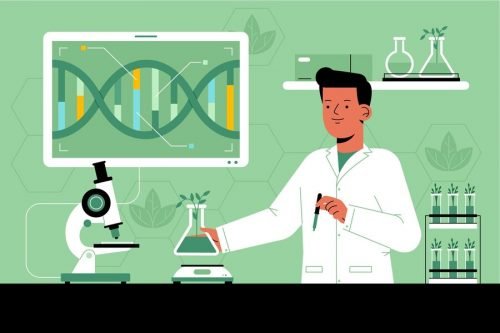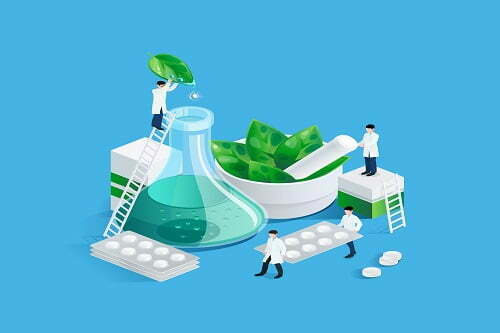Table of Contents
What is Biotechnology Engineering Course?
- Biotechnology Engineering courses are degree programs that involve applied sciences in the field of biology, medicines, and engineering, along with other useful applications.
- The course could be both undergraduate and postgraduate programs whose duration can be of 4 years and 2 years, respectively.
- A lot of students are considering this field of study to be pursued for long-term careers and become research scientists.
- Students who have pursued or are looking to pursue this degree have a lot of career opportunities for them, like working in research laboratories, universities and colleges, hospitals, and healthcare centers. It has become one of the most sought-after courses over the years.
- Biotechnology Engineering course is a very fruitful branch of science and with very progressive technology too.
- The different branches of this course are chemistry, biology, physics, mathematics, and engineering.
- The principles of this field are to develop different technologies and products for a better human life.
Eligibility Criteria for Biotechnology Engineering Courses
The eligibility criteria for this course are different for different programs. The eligibility criteria for an undergraduate program in this field is –
- All international students must provide a 12th-grade certificate with an 80% or more score (Background in science is preferred).
- SAT scores (800+) and ACT scores (35+) are generally accepted in most universities.
- International students are required to give proof of English language proficiency via IELTS (7+) or TOEFL (85+).
- Students are required to give tests provided by their preferred universities.
Biotechnology Engineering
The curriculum required for biotechnology engineering is very interesting and different from other courses. The basic topics and course objectives are mentioned below.
| Subjects | Topics | Objective |
|---|---|---|
| Life Sciences | Nutrition Histology Origin of life Energy Utilization | This course is based on the discipline of life sciences and everything related to it. |
| Inorganic Chemistry | Chemical bonding Polymers Acids and Bases Colloids Catalysis | The concepts of inorganic chemistry. |
| Foundation course in Physics | Interference by the division of diffraction Introduction to lasers Fibre Optical Wavefront Polarization | This course provides the foundation of physics. |
| Concepts in Biotechnology | Plant cell culture Introduction to biotechnology Protein structure and engineering | The course provides the basics of the concepts in biotechnology. |
| Essential in Mathematics | Mean value theorems Partial derivatives Quadratic forms Algebra of matrices | This course is seen as an essential part of the core curriculum of biotechnology engineering. |
| Foundation course in Organic Chemistry | Electronic displacements Stereochemistry Reactive intermediaries | This course gives an insight into organic chemistry. |
| Introduction to Computers | Data storage Programming using C Introduction | Students get to learn the basics of programming languages and computers in general. |
| Microbiology | Microbes in human life Microbial growth Functional anatomy | This is considered a very important subject in this field. |

| Cell Biology | Cell signaling Nucleus Cell cycle and division Cell | This course provides an insight into cells and other microorganisms. |
|---|---|---|
| Bioenergetics | Nucleic acids Lipids Carbohydrates Biochemical evolution | The study of living systems and energy flow is given in the study. |
| Animal Biotechnology | Design, layout, and equipment Primary culture Introduction to animal tissue culture | The study of engineering and sciences in living organisms is a part of this curriculum. |
| Developmental Biology | History and basic concepts Morphogenesis Germ cell | This course is mainly focused on the study of plants and animals. |
| Enzyme Technology | Introduction to enzymes Immobilization of enzyme Specificity of enzymes | This course is a subfield under the huge spectrum of biotechnology. |
| Plants Tissue Culture | Cellular totipotency Haploid culture Cell and suspension culture Protoplast culture | The course teaches how to grow plant tissues and cells in a lab. |
| Chemical Engineering | The flow of incompressible fluids Chemical equations Hearts of solution | The course introduces the students to the basic concepts of chemical engineering. |
| Cell Biology | Cell signaling Nucleus Cell cycle and division Cell | These functions of living cells in mentioned in this course. |
| Electric Sciences | Properties of conductor and insulators Transformers Alternating currents Measuring instruments | This course provides the basics of electrical sciences and electronics. |
Skills required for biotechnology engineering courses
Biotechnology engineers require a certain skill set to work in this particular field. These skills are –
- Polymerase Chain Reaction (PCR) is a technique used to make many copies of a particular region of DNA.
- Tissue culture is a very valuable skill for biotechnology engineers as it is widely used in the biology research lab.
- Electrophoresis is also a popular skill set among biotechnology engineers.
- Molecular or Gene cloning is a technique used to assemble molecules and is very popular in this field.
- Western blot or protein immunoblot is also required.
- Another useful technique is cell-based assays.
- A laser-based technique or flow cytometry is a technique that is also very useful.
- Mass Spectrometry (MS) is an analytical technique that is used to ionize chemical species. This technique also comes under the vast spectrum of required skills for this field.
- A format of wet-lab technique that is also known as Enzyme-linked Immunosorbent Assay (ELISA) is also a popular technique.
- A confocal microscope operates by removing light from out-of-focus areas of the lens to increase the optical resolution and contrast of a micrograph.
Top Institutions
There are several universities that offer different courses in this field – undergraduate, postgraduate, and doctorate programs.
Undergraduate programs and universities –
| (Biochemistry) Bachelor of Science | University of California (Los Angeles) |
| The University of Pennsylvania | |
| (Bioinformatics) Bachelor of Science | University of California (San Diego) |
| (Biochemistry and Molecular Biology) Bachelor of Science | Brown University |
| (Molecular Biophysics) Bachelor of Science | Yale University |
| Washington University | |
| Boston University | |
| Duke University | |
| (Biochemistry and Cell Biology) Bachelor of Science | University of California (San Diego) |
Master’s programs and top universities providing the course –
| (Bioinformatics) Masters of Science | University of California (Los Angeles) |
| Johns Hopkins University | |
| New York University | |
| (Biotechnology – Life Sciences) Masters of Business Administration | Harvard University |
| (Biotechnology) Master Liberal Arts/Science | Columbia University |
| Harvard University | |
| Northwestern University | |
| New York University | |
| (Biometry) Master of Science | University of Wisconsin |
| (Biochemistry) Master of Science | The University of Michigan |
| University of California (Los Angeles) |
Doctorate degrees and the universities offering this course –
| (Biochemistry) Doctorate of Philosophy | Stanford University |
|---|---|
| (Comparative Biochemistry) Doctor of Philosophy | University of California, Berkeley |
| (Biochemistry – Cellular and Molecular Biology) Doctor of Philosophy | Johns Hopkins University |
| (Biochemistry – Cell & Developmental Biology) Doctor of Philosophy | Emory University |
| (Bioinformatics, Integrative Genomics) Doctor of Philosophy | Harvard University |
Course Highlights

The course has been a popular choice amongst young adults. The wide career choices and incredible and interesting job opportunities in this field have attracted many students. Here are some reasons why this course can be chosen.
- This field has immense capabilities to help one grow professionally.
- Biotechnology Engineering is one of the most popular subjects and is seen as a powerful educational tool.
- This field not only contributes to biological sciences and technology but also other industries like pharmaceuticals, gene therapy, and cell biology, and has other useful applications.
- Studying this course does not limit one to a particular sector. One is capable of working in both government and private sectors.
- There are several experienced professionals in this field which give a great opportunity to engage and build a strong network.
Conclusion
- The field of biotechnology is one of the most rapidly developing fields.
- Industry observers compare it to the rapid growth of the IT industry all over the world.
- There are many opportunities in this booming industry. The course has a plethora of useful applications and career options.
- A career in this field is highly rewarding.
That’s all for now! If you have any more questions about the biotechnology engineering course or which program to choose, you can drop a comment below on reach out to us.
Liked this blog? Read: Frequently asked questions in Biotechnology interviews | Top 10
FAQs
Q. What is a biotechnology engineering course?
A. Engineering education is combined with biological training for research and development. The field of Biotechnology Engineering combines engineering, chemistry, genetics, biochemistry, and microbiology.
Q. What are biotechnology engineering course fees?
A. The course fees generally depend on the subject you are taking. The average range is from $42,000 – $1,33,280. It can vary from college to college.
Q. What is the difference between genetic engineering and biotechnology courses?
A. Biotechnology refers to using a biological system, product, or organism as a technological tool that will benefit the consumer financially, whereas genetic engineering is the modification of the genome of an organism to produce the desired outcome.






